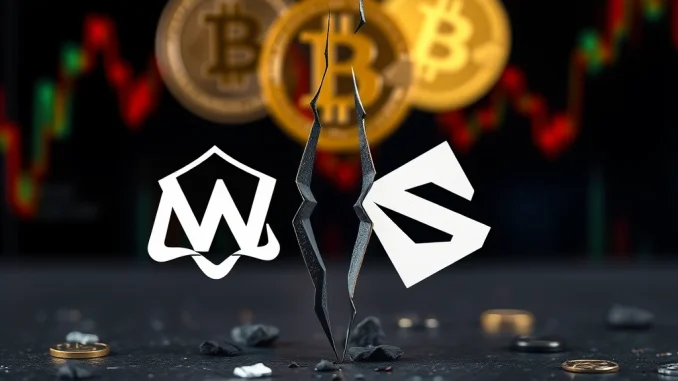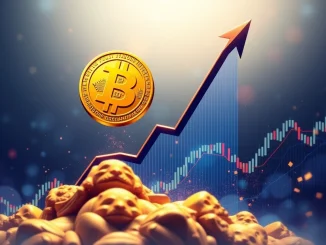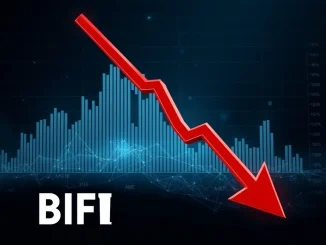
The fast-paced world of cryptocurrency often brings unexpected twists. One such recent development involves Kaito, an AI-based Web3 platform, and its brief partnership with Web3Port. In a move that caught many observers by surprise, Kaito announced the termination of its market-making agreement with Web3Port just 10 days after it began. This decision highlights the challenges and risks projects face during critical phases like token launches and underscores the importance of reliable partners in the volatile Kaito Crypto ecosystem.
Why the Abrupt Split? Kaito Crypto’s Decision Explained
Kaito shared the news via a post on X (formerly Twitter), stating that the agreement with the Chinese firm Web3Port was officially ended on February 27th. This came shortly after the deal was signed on February 17th, intended to support the stability of the KAITO token price around its Token Generation Event (TGE) on February 20th.
According to Kaito, the primary reason for the swift termination was concern over Web3Port’s execution of the market-making duties. While the exact details of the performance issues were not elaborated upon in the initial announcement, Kaito emphasized that their decision was made based on their own assessment and occurred before wider media reports and exchange investigations into Web3Port’s alleged misconduct surfaced regarding another project’s token listing (MOVE) in March.
Understanding Crypto Market Making and Its Risks
Market making is a crucial activity, especially for new tokens. Here’s a quick breakdown:
- What it is: Market makers place buy and sell orders on exchanges to create liquidity. This narrows the gap between the highest price a buyer is willing to pay (bid) and the lowest price a seller is willing to accept (ask).
- Why it’s needed: Good market making ensures traders can easily buy or sell a token without causing massive price swings, which is vital for price discovery and maintaining confidence, particularly after a TGE.
- The Goal: For projects like Kaito, a market-making deal aims to provide a stable trading environment and support the token’s initial price performance.
However, market making is not without risks or potential pitfalls. Poor execution, lack of sufficient capital deployment, or even alleged manipulative practices by a market maker can harm a token’s reputation and price stability. The situation involving Kaito and the subsequent Web3Port Allegations in the broader market underscore these potential dangers.
Connecting the Dots: Web3Port Allegations and Token Listing Problems
While Kaito stated its decision was based on performance concerns predating public reports, the timing is notable. Following Kaito’s termination, reports emerged detailing alleged issues with Web3Port’s involvement in the token listing of the MOVE project on CoinW exchange. These allegations included accusations of wash trading, market manipulation, and misleading investors. These broader Web3Port Allegations highlight potential systemic issues that projects need to be wary of when selecting partners for critical market functions.
For any project undergoing a token launch, ensuring the integrity and competence of partners involved in market activities is paramount. Incidents like this serve as a stark reminder of the Token Listing Problems that can arise if due diligence is insufficient or if partners fail to act responsibly.
Kaito’s Stance: No Sales and Ongoing Buyback
Amidst the news of the terminated deal and the wider industry discussions, the Kaito Foundation also took the opportunity to clarify its own position regarding the KAITO token supply. They explicitly stated that the Foundation has not sold any KAITO tokens.
Furthermore, Kaito confirmed it remains a net buyer of its own token through an ongoing buyback program. This action is typically intended to demonstrate confidence in the project’s future and provide additional buying pressure on the market, potentially counteracting negative sentiment from the terminated market-making deal or general market volatility.
Implications and What’s Next in Web3 News Update
The Kaito/Web3Port situation offers several takeaways for the crypto community:
- Partner Vetting: Projects must conduct rigorous due diligence on market makers and listing partners. Reputation, track record, and transparent practices are critical.
- Performance Monitoring: Agreements should include clear performance metrics and termination clauses for non-compliance.
- Transparency: Kaito’s public announcement, while brief, provided clarity on their decision and their own token holdings/activities, which helps manage community expectations.
This event will likely be discussed within broader Web3 News Update cycles as the industry continues to mature and grapple with issues of market integrity and partner accountability. For Kaito, the immediate next step is securing a reliable market-making solution to ensure the desired liquidity and stability for the KAITO token moving forward.
Conclusion: Navigating the Challenges
Kaito’s decision to quickly end its market-making deal with Web3Port underscores the challenges faced by projects launching tokens in the current market. While the initial partnership aimed to support the KAITO token, concerns over execution led to a swift termination, a move Kaito says preceded broader allegations against Web3Port. By terminating the deal and reaffirming its commitment through a buyback program, Kaito aims to navigate this hurdle and maintain confidence within its community. This incident serves as a cautionary tale about the critical importance of selecting trustworthy and effective partners in the complex world of crypto market operations.



